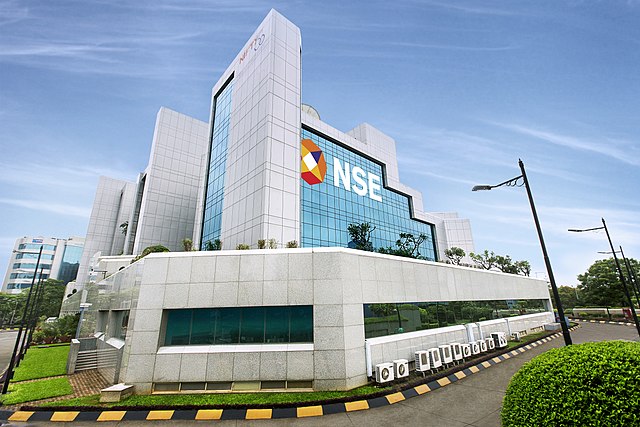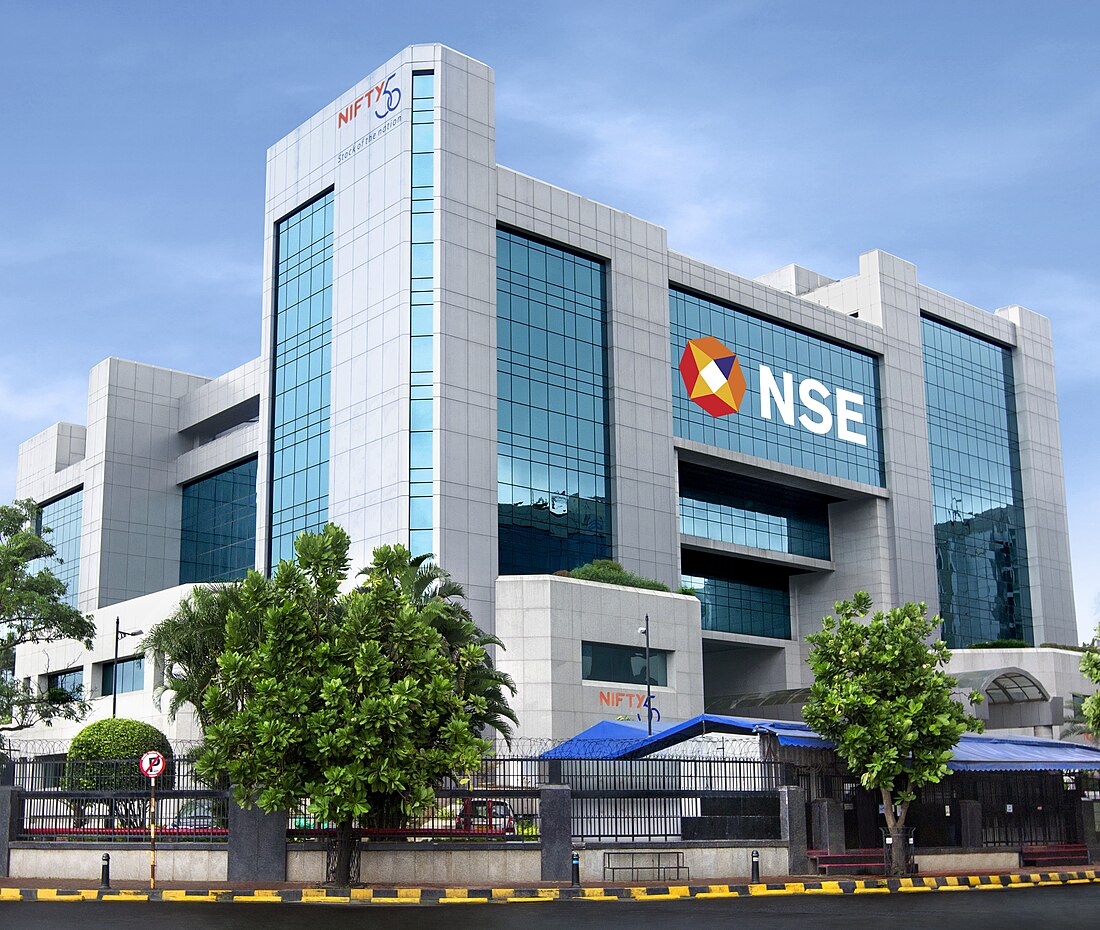National Stock Exchange of India
Indian stock exchange From Wikipedia, the free encyclopedia
National Stock Exchange of India Limited (NSE) is an Indian stock exchange, based in Mumbai. It is the 7th largest stock exchange in the world by total market capitalization, exceeding $5 trillion in May 2024.[6][7]
 | |
 | |
| Type | Stock exchange |
|---|---|
| Location | Mumbai, Maharashtra, India |
| Founded | 27 November 1992 |
| Owner | Various domestic and global financial institutions, public and privately-owned entities, and individuals[1] |
| Key people | Ashishkumar Chauhan (MD & CEO) |
| Currency | Indian rupee (₹) |
| No. of listings | 2,671 (December 2024)[2][3] |
| Market cap | ₹438 lakh crore (US$5.2 trillion) (December 2024)[2][4] |
| Indices | |
| Website | www |
| Company | |
| ISIN | INE721I01024 |
| Headquarters | |
| Revenue | ₹16,352 crore (US$1.9 billion) (2024) |
| ₹8,306 crore (US$980 million) (2024) | |
| Website | www |
| Footnotes / references Financials as of 31 March 2024[update].[5] | |

NSE is under the ownership of various financial institutions such as banks and insurance companies. As of 2024, it is the world's largest derivatives exchange by number of contracts traded[a] and the third largest in cash equities by number of trades[b] for the calendar year 2023.[8][9][10]
History
Summarize
Perspective

National Stock Exchange was incorporated in 1992[11] to bring about transparency in the Indian equity markets. NSE was set up at the behest of the Government of India, based on the recommendations laid out by the Pherwani committee in 1991[12] and the blueprint was prepared by a team of five members (Ravi Narain, Raghavan Puthran, K Kumar, Chitra Ramkrishna and Ashishkumar Chauhan) along with R H Patil and SS Nadkarni who were deputed by IDBI in 1992.[13][14] Instead of trading memberships being confined to a group of brokers, NSE ensured that anyone who was qualified, experienced, and met the minimum financial requirements was allowed to trade.[15]
NSE commenced operations on 30 June 1994[16] starting with the wholesale debt market (WDM) segment and equities segment on 3 November 1994.[17] It was the first exchange in India to introduce an electronic trading facility.[18] Within one year of the start of its operations, the daily turnover on NSE exceeded that of the BSE.[13]
Operations in the derivatives segment commenced on 12 June 2000.[17] In August 2008, NSE introduced currency derivatives.[19]
In 2012, NSE launched the NSE EMERGE platform for the listing of small and medium-sized enterprises (SME) and startup companies in India.[20][21]
In May 2013, NSE launched India's first dedicated trading platform for debt-related products.[22]
In 2023, NSE launched the Social Stock Exchange to allow social enterprises, including non-profit organisations, raise funds from the public.[23]
Trading
Summarize
Perspective
Listings
As of December 2024, NSE has 2,671 companies listed, with 2,084 companies listed on the mainboard and 587 companies listed on its SME platform−NSE EMERGE.[24] Total market capitalization of NSE-listed companies was ₹438.9 lakh crore (US$5.13 trillion), as of 31 December 2024.[2]
As of December 2023, there were 190 ETFs listed on the NSE, including ETFs on equity, debt and commodity asset classes.[25] The first InvIT listed on the NSE in 2017 and the first REIT in 2019.[26][27]
As of January 2025, NSE has over 11 crore unique registered investors.[28]
Indices
NSE Indices operates NSE's broad-based, sectoral, thematic, strategy and fixed-income indices.[29] The flagship index NIFTY 50 was launched on 22 April 1996, with a base value of 1,000 on the base date of 3 November 1995.[30][31]
Derivatives
The NSE allows trading of futures and options contracts of indices and single stock contracts.[32]
On 3 May 2012, the National Stock exchange launched derivative contracts (futures and options) on FTSE 100, a widely tracked index of the UK equity stock market.[33] On 10 January 2013, the National Stock Exchange signed a letter of intent with the Japan Exchange Group, Inc. (JPX) for the launch of NIFTY 50 index futures on the Osaka Securities Exchange (OSE).[34][35]
Corporate affairs
Stakeholders
As of March 2025, state-owned Indian investors in NSE include Life Insurance Corporation (10.7% stake), State Bank of India (3.23%), SBI Caps (4.33%) and Stock Holding Corporation of India Limited (4.4%). Private equity investors include Aranda Investments Mauritius Pte Ltd (Temasek Holdings), PI Opportunities Fund I (PremjiInvest) and MS Strategic Mauritius Pte Ltd (Morgan Stanley).[36]
Leadership
The list of CEO and MDs of NSE includes:
| No. | Name | Term of office | Ref. | ||
|---|---|---|---|---|---|
| Assumed office | Left office | Time in office | |||
| 1 | Ravi Narain | 2000 | 1 April 2013 | 12 years, 151 days | [37] |
| 2 | Chitra Ramkrishna | 1 April 2013 | 2 December 2016 | 3 years, 245 days | [38] |
| 3 | Vikram Limaye | 6 February 2017 | 16 July 2022 | 5 years, 160 days | [39] |
| 4 | Ashish Chauhan | 18 July 2022 | Incumbent | 2 years, 289 days | [40] |
Subsidiaries
- NSE Indices Limited
- NSE Clearing Limited
- NSE NSEIT
- NSE Infotech Services Limited
- NSE Cogencis Information Services Ltd
- NSE IFSC Clearing Corporation Limited (NICCL), or simply NSE International Clearing
- NSE IFSC Limited, or simply NSE International Exchange
- NSE Investments Limited
- NSE Data & Analytics
- NSE Academy Limited[41]
Financial literacy
Summarize
Perspective
NSE has collaborated with several universities like Gokhale Institute of Politics & Economics (GIPE) - Pune, Bharati Vidyapeeth Deemed University (BVDU) - Pune, Guru Gobind Singh Indraprastha University - Delhi, RV University[42] - Bangalore, the Ravenshaw University of Cuttack and Punjabi University - Patiala, among others to offer MBA and BBA courses. NSE has also provided mock market simulation software called NSE Learn to Trade (NLT) to develop investment, trading, and portfolio management skills among the students.[43] The simulation software is very similar to the software currently being used by the market professionals and helps students to learn how to trade in the markets. NSE also conducts online examinations and awards certification, under its Certification in Financial Markets (NCFM) programs.[44] NSE has set up NSE Academy Limited to further financial literacy.
At present, certifications are available in 46 modules, covering different sectors of financial and capital markets, both at the beginner and advanced levels. The list of various modules can be found at the official site of NSE India. In addition, since August 2009, it has offered a short-term course called NSE Certified Capital Market Professional (NCCMP).[45]
Criticism and controversies
Summarize
Perspective
Market manipulation
The Indian stock exchanges BSE and NSE have witnessed several corruption scandals.[46][47][48][49][50][51][52][53][54][55][56][57][58][59] At times, the Securities and Exchange Board of India (SEBI) has barred several individuals and entities from trading on the exchanges for stock manipulation, especially in illiquid smallcaps and penny stocks.[60][61][62][63][64][65][66][67]
Market operators illegal activity
Market operators continue to operate in the Indian stock market, albeit within a regulatory framework aimed at ensuring transparency and fairness. Market operators are individuals or entities that actively engage in buying and selling securities to influence their prices for profit. They operate through various strategies, such as arbitrage, short selling, high-frequency trading, front running, churning, scalping, wash trading, spoofing, and layering, often leveraging sophisticated technology and large capital. Regulatory bodies like the Securities and Exchange Board of India (SEBI) oversee market activities to curb malpractices such as insider trading, price rigging, and market manipulation. SEBI has implemented measures, including surveillance systems, to detect and penalize unethical practices. Despite these regulations, market operators exploit loopholes to gain an edge, necessitating continuous vigilance and regulatory updates. Market operators in India often use the "pump and dump" strategy, despite strict regulations against such practices. The "pump and dump" scheme involves artificially inflating the price of a stock (pump) through false or misleading positive statements. Once the price has been significantly raised, the operators then sell off their holdings (dump) at the inflated prices, leading to a sharp price decline and substantial losses for other investors who bought in at the higher prices. Their activities have continued to impact market volatility, liquidity, and price discovery, playing a significant role in the dynamics of the Indian stock market.[68][69][70][71][72]
NSE co-location scam
On 8 July 2015, Sucheta Dalal wrote an article on Moneylife alleging that some NSE employees were leaking sensitive data related to high-frequency trading or co-location servers to a select set of market participants so that they could trade faster than their competitors. NSE alleged defamation in the article by Moneylife. On 22 July 2015, NSE filed a ₹1 billion (US$12 million) suit against the publication.[73] However, on 9 September 2015, the Bombay High Court dismissed the case and fined NSE ₹5 million (US$59,000) in this defamation case against Moneylife.[74] The High Court asked NSE to pay ₹150,000 (US$1,800) to each journalist Debashis Basu and Sucheta Dalal and the remaining ₹4.7 million (US$56,000) to two hospitals. The Bombay High Court has stayed the order on costs for a period of two weeks, pending the hearing of the appeal filed by NSE.[75]
The board also passed orders against 16 individuals including former managing directors and CEOs Ravi Narain and Chitra Ramakrishna ordering them to disgorge 25% of their salaries during that period along with interest. All money is to be paid into the Investor protection and education fund. These individuals have also been debarred from the markets or holding any position in a listed company for a period of five years.[76]
See also
Notes
- Based on the statistics maintained by Futures Industry Association (FIA), a derivatives trade body
- As per the statistics maintained by the World Federation of Exchanges (WFE)
References
Further reading
External links
Wikiwand - on
Seamless Wikipedia browsing. On steroids.
